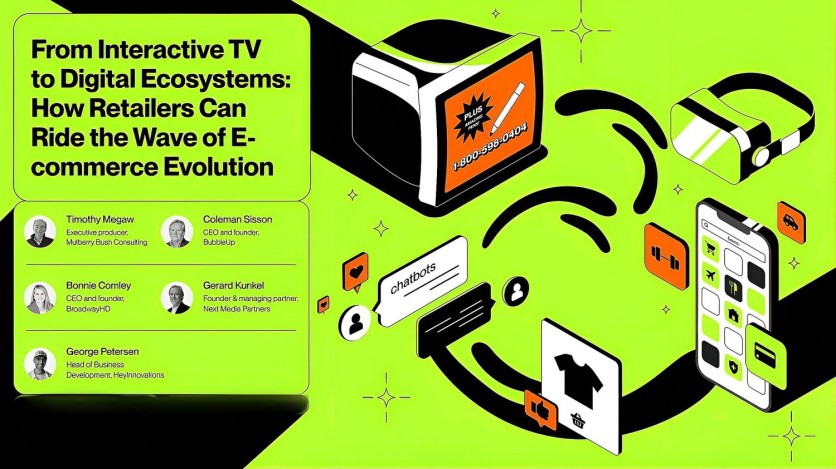
E-commerce has evolved from interactive TV to AI-powered chatbots, virtual fitting rooms, delivery robots, and digital ecosystems encompassing all customer needs. International e-commerce experts Bonnie Comley, Gerard Kunkel, Timothy Megaw, and Coleman Sisson spoke with George Peterson during a recent online conference. They shared their thoughts on how technology has changed the retail landscape in the past two decades. They offered suggestions and solutions to embrace to become a game changer in the industry.
HeyInnovations, an expert in creating digital marketplaces, defines a digital ecosystem as "seamless networks of services that add value to the core business and boost revenue with cross-selling." Their ten-step program to create an ecosystem is as follows:
Step 1:
Define your core competency.
Step 2:
Center the ecosystem around the highest frequency service.
Step 3:
Plan the user flow from basics to more advanced tasks.
Step 4:
Match your resources with customer needs.
Step 5:
Create services within the existing business resources, starting with the highest frequency ones.
Step 6:
Unify the services through a common loyalty program and user profile.
Step 7:
Merge the online and offline customer experiences.
Step 8:
Redirect the traffic from the core service to the subsidiaries with favorable offers.
Step 9:
Diversify the main business with additional services while retaining a competitive advantage.
Step 10:
Converge all business processes into one digital environment.
Using digital ecosystems as the backdrop to the conversation, the experts shared some history and thoughts. Gerard Kunkel is the founder and managing partner of Next Media Partners. He is described as "The Godfather of Interactive TV." Gerard and his company, WorldGate, were the pioneers of interactive technology back in 2000. Today, his advisory company, Next Media Partners, provides advanced technology consulting for media and entertainment.
Kunkel explains his vision in the 1990s: "The goal was to combine the huge audiences that television networks and programming networks had in the marketplace for their programming with some form of interactivity. The desired result was to be able to advertise to all of those people in many cases at the same time, but then allow them the opportunity to dive deeper into the purchase funnel and make a transaction." It was the birth of "e-commerce," something we take for granted now, but at the time seemed impossible.
Timothy Megaw, Executive Producer of Mulberry Bush Consulting. Timothy consults enterprises in the US, UK, and the Middle East. His previous strategic and tactical senior management leadership roles include managing large organizations with staff exceeding 500 and P&L responsibility for significant operations and capital expenditures of $20 to $50 million. Megaw directed operations across industries through migration from broadcasting to merchandising and marketing in electronic retail, broadcasting, and the food industry.
At QVC, Megaw delivered excellent sales and growth results, including double-digit growth and building successful teams. Megaw pioneered the QVC interactive development and shopping app in 2001 and went on to develop and produce GSN's "Playmania"—America's first interactive network TV show. QVC's genius was that the video content of shopping was entertainment. The on-camera talent was not only salespeople but also early influencers as they became TV personalities driving sales. Megaw pioneered the layering of technology with apps to make shopping fun, accessible, and consumer-friendly.
Coleman Sisson is the CEO and founder of BubbleUp. As President of Liberate Technologies, Coleman paved the way for interactive consumer access, introducing transactions through the STB. Now, he is leading a digital marketing agency that partners with both Fortune 500 companies and world-class artists such as Margaritaville, Live Nation, Jimmy Buffett, Eagles, Avett Brothers, Khruangbin, and more. Sisson describes one of the pitfalls of being the first to invent or use certain combinations of technology with the following: "Being at the forefront of technology in the interactive TV world means you fall in love with it; you're sure you have something that people will want. But the question is: What's the difference between being wrong and being too early? The answer is nothing. But if you're early, you hope you can survive long enough for the world to catch up." Sisson has survived and thrived.
Bonnie Comley, CEO and founder of BroadwayHD, a streaming platform that delivers over 300 on-demand stageplays and musical productions globally, is listed in the Guinness Book of World Records for the first live stream of a Broadway show, using technology to distribute the live stage show to an audience outside the four walls of the Broadway theater. Comley has aggregated high-quality Broadway content and created a destination for viewers and an online community for the fans, all while supporting the live stage shows.
George Petersen, Head of Business Development at HeyInnovations, moderated the panel discussion, which is available to view in its entirety on YouTube. As Head of Business Development at HeyInnovations, George helped folks at Land Rover, Leroy Merlin, Haier, and others figure out their business needs regarding digital solutions, e-commerce, and mobile app development. Peterson said, "I'm really passionate about this topic, and I'm happy that we gathered some of the leading minds today to share their wisdom and perspective with us. Thank you to Bonnie Comley, Gerard Kunkel, Timothy Megaw, and Coleman Sisson for their participation on this panel, 'Innovation in E-commerce: Learning from the Past to Thrive in the Future.'"




